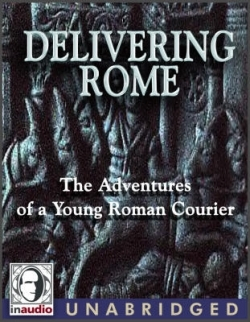
Delivering Rome
The Adventure of a Young Roman Courier
The Learning Literature Series from Sound Room Publishers uses colloquial and vernacular language and contemporary images to tell the great stories of literature and history to young adults. This CD book takes the birthday of nine-year-old Martial Portius as the starting point for explaining the customs, beliefs, arts, foods, system of government, religion, society, and sports of ancient Rome.
Martial’s father, a plebian and artisan, has been given free tickets to attend the Circus of Maximus, an unheard-of luxury for a mosaic artist who barely earns enough to feed his family and pay the rent. Martial’s older brother, Hershal, works as a courier and has grandiose plans for the future. He intends to “join the Army of the Empire,” have “a statue built for me,” “buy a noble home,” and be “elected to the Senate.” In contemporary terms, he wants the American Dream. When Hershal leaves his satchel on the floor of the bedroom they share, Martial follows him throughout the streets of Rome in hopes of catching up with him before he reaches his place of employment.
The book’s narrator varies his tone and pitch to suggest characters’ personalities and nationalities. The sound effects are minimal, leaving the changes in scenery to the listener’s imagination. The author has written two previous children’s books, The Picture Wagon and Saving Christmas Spirit. Here, like Chaucer’s “Canterbury Tales,” Getzinger sets up her story’s structure in ways designed to make her point. Martial comments on the “horse leavings,” “chamber pots,” and avoiding the “refuse tossed from windows,” as he runs through the crowded streets. He knocks over a vendor’s cart and spends his coins on food because “people in this part of town have no money.” He encounters a slave who discusses “buying my freedom” and what it was like living under someone else’s rule for twenty years.
Martial meets a man with a Greek accent. They have a lengthy discussion about what the Romans have borrowed from the Greeks, including elements of the Greek faith that have been incorporated into the Roman belief system. Martial decides that he “is very proud of being Roman.” When he worries that he’ll never catch up with Hershal, Martial prays to a statue of Mars, the Roman god of war.
The most important lesson Hershal learns is the value of learning to read and write. While the book’s message and tone are somewhat heavy-handed, the underlying themes and approach will work for younger students.
Reviewed by
Pam Kingsbury
Disclosure: This article is not an endorsement, but a review. The publisher of this book provided free copies of the book to have their book reviewed by a professional reviewer. No fee was paid by the publisher for this review. Foreword Reviews only recommends books that we love. Foreword Magazine, Inc. is disclosing this in accordance with the Federal Trade Commission’s 16 CFR, Part 255.
